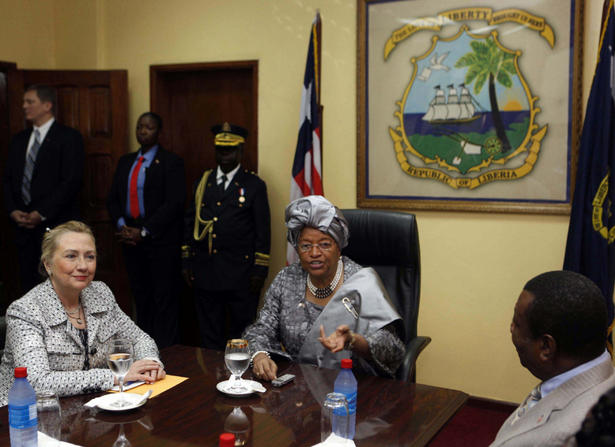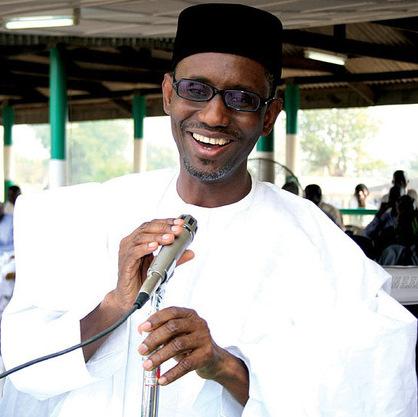Charles Taylor a CIA Informant “” Liberia’s Relationship with the US needs to be retooled – By Robtel Neajai Pailey


Clinton and Johnson Sirleaf meet for the latter's swearing in a President, underlying the continuing close relations between the US and Liberia
This op-ed was written based on a front page Boston Globe article on Jan. 17, which asserted that Charles Taylor was a CIA informant. However, the Globe on Jan. 25 retracted its statement through an editor’s note that said the CIA refused to release 48 documents to the Globe pertaining to Charles Taylor’s alleged relationship with American intelligence. The author’s position about Liberia retooling its relationship with the United States remains the same.
Two very significant and interconnected events happened this week in Liberia – President Ellen Johnson Sirleaf was inaugurated for a second term with a subdued opposition attending the ceremonies, and former Liberian President Charles Taylor was implicated in a Boston Globe article for serving as a CIA informant beginning in the early 1980s and spanning many decades.
Taylor, Taylor, How Did Your Garden Grow?
Taylor, who currently languishes in a jail cell in the Hague after undergoing trial for 11 counts of crimes against humanity in the Sierra Leonean civil war, has ironically never faced trial for the atrocities that he orchestrated, oversaw, and implemented in Liberia. The bombshell news that he was indeed a CIA informant in the early years of his rise to notoriety calls into question America’s complicity in Taylor’s destruction of Liberia.
America’s facilitation of Taylor’s escape from a maximum security prison in Boston in 1985 – while he was facing extradition to Liberia for allegedly stealing US$1 million from the General Services Agency, which he headed during President Samuel Kanyon Doe’s regime – was always rumored but never corroborated. I remember covering the first day of Taylor’s trial in the Hague for Pambazuka News, and interviewing Stephen Rapp, the then chief prosecutor, about whether or not his investigations into Taylor’s exploits in Libya and Sierra Leone ever unearthed the real causes of his “˜escape’ from the maximum security prison in Massachusetts. Rapp was tight-lipped, yet appeared confounded by this mystery as well. When Taylor eventually confessed during the Hague trial that he strolled out of prison after a guard conveniently opened his cell one night, we all knew that something was awry: “I am calling it my release because I didn’t break out,” Taylor testified. “I did not pay any money. I did not know the guys who picked me up. I was not hiding [afterwards].”
The Taylor-CIA connection has re-inscribed for Liberians an age-old dilemma, what to do with our so-called historical relationship with the United States, which has been fraught with betrayal after betrayal. Liberians who have been commenting on various notice boards are justifiably angry, upset and disappointed, but not surprised. This is the validation we’ve been wanting for years, and it comes on the heels of the inauguration for a second term of our head of state, who was ironically pictured dedicating the new U.S. Embassy in Liberia this week, with a smiling Secretary of State Hillary Clinton in the foreground.
Some Liberians, under anonymity, are arguing that U.S. authorities who courted Taylor for intelligence be brought to justice for crimes against humanity in the Liberian civil war, that the International Criminal Court – now headed by a female Gambian national – should exhibit blind justice, that instead of hauling African and non-Western leaders to the international body for prosecution, they too should face the full weight of the law. I tend to agree with these arguments, however radical and farfetched they may seem.
Inquiring Liberian Minds Deserve to Know
The Globe article recounts that the CIA has said releasing further information could be a national security threat. A threat to whom, might I ask? Liberians deserve to know the nature, duration, scale, and scope of the CIA-Taylor relationship, it is a part of our national history, and must be recounted in the history books for our children, and our children’s children to remember that a relationship with the U.S. must be monitored at all times.
Liberians are not gullible, nor are we unsophisticated in realizing that one plus one equals two. We’ve always known that the dubiousness surrounding Taylor’s escape from the Massachusetts maximum-security prison was the beginning of the end for us. And if the implications of the Globe article are true, then the CIA could provide more answers.
It’s no wonder that the U.S. didn’t intervene in the Liberian civil war, though Liberians begged and pleaded for its “father/mother” to stop us from killing each other. One U.S. diplomat at the time even said that “Liberia is of no strategic interest to the United States.” It begs the question, if Liberia was of “no strategic interest” during the war, when we were killing ourselves and each other in the name of liberation, what is Liberia’s strategic interest to the U.S. now, when U.S. NGOs and development workers abound, and the Peace Corps has reinserted itself?
This should send a strong signal to Liberians and Liberia once and for all that America cannot be trusted. From Noriega, to Osama, to Saddam, to Samuel Doe, authoritarian leaders who end up in the U.S.’s good graces are never there for long.
Limits of Reciprocity
What Liberians and the Liberian government should be doing is strategizing, devising our own “Liberia Policy for the U.S.” which factors in seriously our checkered history with unsentimental bias.
We should also rely on a corpus of intellectual and creative work that has already investigated our “˜limits of reciprocity’ with the United States. Liberian filmmaker Nancee Oku Bright’s film, Liberia: America’s Stepchild, explores the torturous relationship between Liberia and the United States, with her thesis being that the U.S. sees Liberia as an “˜outside’ child, one who is illegitimate upon conception and can be used and abused at will without consequence. And Liberian academic Dr. D. Elwood Dunn also interrogates this relationship in his book, Liberia and the United States During the Cold War: Limits of Reciprocity, showing that the Cold War placed Liberia in a very strategic position to exploit its relationship with the United States, yet with unintended consequences.
In this new political dispensation, it should be clear that Liberia should hold the U.S. at arm’s length, that hosting AFRICOM or any U.S. satellite post is out of the question, that we have to use them just as strategically as they have used us. With the geopolitics of China and other emerging nations, Liberia needs to develop a “Look South Policy,” not because we have become alienated, as in the case of Zimbabwe, but because we have made a conscious decision to explore other options, remembering that the U.S. will act only in its interest and leave those caught in the crossfire to fend for themselves.
We deserve to know the details of Taylor’s relationship with the CIA. It is crucial to our development planning, historical remembrance, healing and nation-building.
Born in Monrovia, Liberia, Robtel Neajai Pailey is currently pursuing a doctorate in Development Studies at the University of London’s School of Oriental and African Studies (SOAS), as a Mo Ibrahim Foundation Ph.D. Scholar.






For what it’s worth, the Globe has basically retracted the original story:
http://www.bostonglobe.com/news/nation/2012/01/25/for-record/I6Lia8WmEGjBxd186zZccJ/story.html